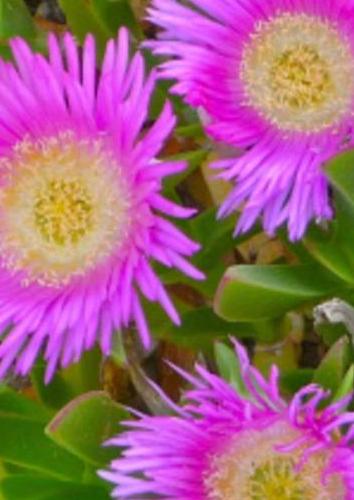Angular sea-Fig Plant
Angular Sea-Fig, is a hardy shrub growing 1-3m, prefers loamy, well-drained soil, full sun, and produces edible fruits with medicinal properties.

Habit
Succulent
Height
1-3m
Growth
Medium
Soil
well-drained, Sandy
Shade
Full
Moisture
Low
Edible
No
Medicinal
Yes
Origin
South Africa
Climatic Condition
Coastal, Sub tropical
Temperature (°)
15-30
Humidity (%)
60-80%
Potting media
Sand + Organic Matter
Fertilizers
Low Nitrogen Fertilizers
Watering
Low Watering
Plant Weight
100-150 g
Flowering Time
Summer to Fall
Soil Ph level
6.0-7.0
Water Ph level
6.0-7.5
Soil EC
1.0 dS/m
Yield Per Plant
Moderate yield
NPK ratio
10:10:10
life Span
2-3 yrs
Health Benefits
Suggested Grow Media or Potting Mix ?
50% loam, 25% compost, 25% sand
Suggested Fertigation/Fertilizers
Fertilize every 3 months with balanced fertilizer.
Common Diseases and Remedies
Powdery Mildew, Aphids, Leaf Spot, Root Rot, Fruit Rot.
White powdery patches on leaves, Curling, yellowing leaves, Brown or black spots on leaves, wilting, decaying fruit.
Apply sulfur-based sprays, Insecticidal soap, neem oil, Prune affected areas, Improve soil drainage, avoid overwatering, Improve air circulation, remove affected fruit.
Fungicides containing sulfur, Imidacloprid-based insecticides, Copper-based fungicides, Fungicides with metalaxyl, Fungicides with copper.
HEALTH BENEFITS
Angular sea fig, also known as Carpobrotus edulis, is a succulent plant native to South Africa but now found in various parts of the world. This plant is often used in traditional medicine, particularly for its potential health benefits. Some of the key benefits of angular sea fig include:
- Anti-inflammatory properties: It contains compounds that may help reduce inflammation, which could be beneficial for conditions like arthritis or general aches and pains.
- Antioxidant-rich: The plant has antioxidant properties, which can help neutralize free radicals in the body and potentially reduce the risk of chronic diseases.
- Wound healing: In traditional medicine, the juice or extract of angular sea fig has been used for its healing properties to treat wounds, burns, and skin irritations.
- Digestive aid: Some cultures use it to support digestive health, as it may help in soothing stomach discomforts and improving digestion.
- Skin benefits: Due to its moisturizing and healing properties, the plant is sometimes used in skincare for soothing dry or irritated skin.
However, it's important to note that while the angular sea fig has traditional uses, scientific research on its full range of health benefits is still limited. Always consult with a healthcare provider before using it for medicinal purposes, especially if you are pregnant or have any pre-existing conditions.

